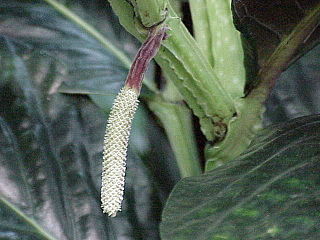
Piper, the pepper plants or pepper vines, is an economically and ecologically important genus in the family Piperaceae.

Chili peppers, also spelled chile or chilli, are varieties of the berry-fruit of plants from the genus Capsicum, which are members of the nightshade family Solanaceae, cultivated for their pungency. Chili peppers are widely used in many cuisines as a spice to add "heat" to dishes. Capsaicin and related compounds known as capsaicinoids are the substances that give chili peppers their intensity when ingested or applied topically. Chili peppers exhibit a range of heat and flavors. This diversity is the reason behind the availability of different types of paprika and chili powder, each offering its own taste and heat level.

Black pepper is a flowering vine in the family Piperaceae, cultivated for its fruit, which is usually dried and used as a spice and seasoning. The fruit is a drupe (stonefruit) which is about 5 mm (0.20 in) in diameter, dark red, and contains a stone which encloses a single pepper seed. Peppercorns and the ground pepper derived from them may be described simply as pepper, or more precisely as black pepper, green pepper, or white pepper.

The Piperaceae, also known as the pepper family, are a large family of flowering plants. The group contains roughly 3,600 currently accepted species in five genera. The vast majority of species can be found within the two main genera: Piper and Peperomia.

Vigna is a genus of plants in the legume family, Fabaceae, with a pantropical distribution. It includes some well-known cultivated species, including many types of beans. Some are former members of the genus Phaseolus. According to Hortus Third, Vigna differs from Phaseolus in biochemistry and pollen structure, and in details of the style and stipules.

Piper excelsum of the pepper family (Piperaceae) and commonly known as kawakawa, is a small tree of which the subspecies P. excelsum subsp. excelsum is endemic to New Zealand; the subspecies P. e. subsp. psittacorum is found on Lord Howe Island, Norfolk Island and the Kermadec Islands.
Japanese pepper is a common name for several plants and may refer to:
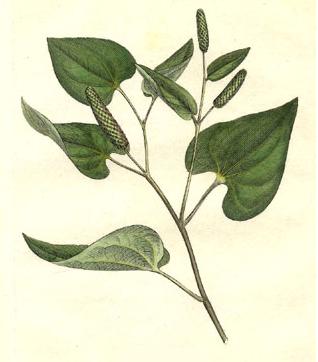
Long pepper, sometimes called Indian long pepper or pippali, is a flowering vine in the family Piperaceae, cultivated for its fruit, which is usually dried and used as a spice and seasoning. Long pepper has a taste similar to, but sweeter and less pungent than, that of its close relative Piper nigrum – from which black, green and white pepper are obtained.

Rohdea japonica is a species of plant native to Japan, China and Korea. Common names include Nippon lily, sacred lily, and Japanese sacred lily.
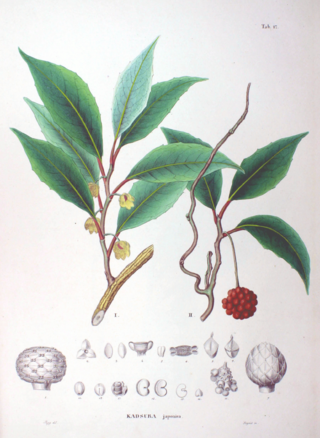
Kadsura japonica, commonly known as the kadsura vine or simply kadsura, is a plant species native to Japan in woodlands. The larvae of the moth Caloptilia kadsurae feed on K. japonica in the main Japanese islands and Ryukyu Islands.

Piper aduncum, the spiked pepper, matico, hierba del soldado, achotlín, cordoncillo, higuillo or higuillo de hoja menuda, is a flowering plant in the family Piperaceae. Like many species in the family, the matico tree has a peppery odor. It grows wild on the coasts and in the forests of Central and South America and in the Interandean Valleys, up to 3,000 m (9,800 ft) above sea level.

Melica is a genus of perennial grasses known generally as melic or melic grass. They are found in most temperate regions of the world.
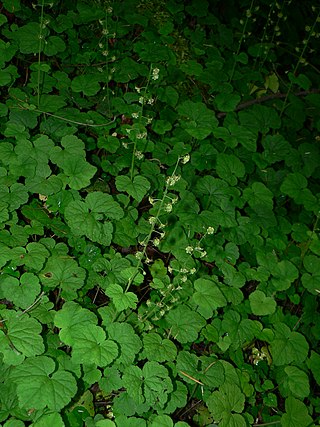
Mitella is a genus of flowering plants known as miterworts or bishop's caps. Mitella species are native to temperate and arctic North America and Asia.

Cuscuta japonica, commonly known as Japanese dodder, is a parasitic vine. It has been listed by the State of California as a noxious weed. It has a range of effects on its host and has repeatedly been introduced to the United States of America. C. japonica looks very similar to other vines, making it difficult to distinguish.

Chionographis is a genus of plants in the Melanthiaceae first described as a genus in 1867. This genus is native to China, Japan, and Korea.
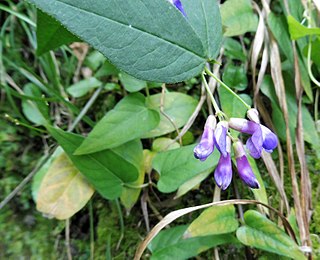
Vicia unijuga, commonly called two-leaf vetch, is a species of flowering plant in the legume family.

Euphorbia sieboldiana, the Siebold's spurge, is a species of flowering plant in the spurge family Euphorbiaceae. It is native to eastern Asia, where it is found in China, Japan, Korea, and eastern Russia. Its natural habitat is in grassy areas and forest margins. It is a common species in Japan.

Scutellaria brachyspica is a species of flowering plant in the mint family (Lamiaceae). It is endemic to Japan, where it is found on the islands of Honshu and Shikoku. It is a common species in Japan. Its natural habitat is in forest edges in hilly areas.
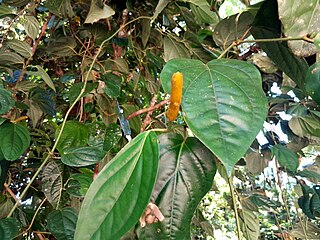
Piper mestonii, commonly known as Queensland long pepper or simply long pepper, is an evergreen vine in the pepper family Piperaceae native to rainforests of New Guinea and Queensland, Australia.

Piper interruptum is a vine in the pepper family Piperaceae, native to the eastern parts of Southeast Asia and to Melanesia and Queensland.





















